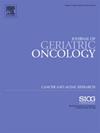Compounding strain: The impact of caregiver strain on health outcomes in older adults with new cancer diagnoses
IF 3
3区 医学
Q3 GERIATRICS & GERONTOLOGY
引用次数: 0
Abstract
Introduction
We sought to examine the association between pre-existing caregiving strain levels and care recipient health outcomes following a new cancer diagnosis.
Materials and Methods
We used the National Health and Aging Trends Study (NHATS) linked with the National Study of Caregiving (NSOC) and Medicare claims to identify older adults receiving family caregiving within one year before an index cancer diagnosis. Caregiving strain was determined using NSOC items of self-reported emotional, physical, and financial difficulties measured before the cancer diagnosis. We used care recipient NHATS responses to determine outcomes with the Patient Health Questionnaire-2 (PHQ-2), Generalized Anxiety Disorder Scale (GAD-2), and self-reported general health pre and post-cancer diagnoses. Multivariable logistic regression models were used to examine care recipient's health outcomes following cancer diagnosis by previously existing caregiver strain levels.
Results
We identified 584 caregivers who had completed the NSOC items related to caregiving strain and were linked to 404 care recipients whose index cancer diagnoses occurred in the year following the NSOC interview. Care recipients with highly strained caregivers were more likely to report anxiety than recipients with less strained caregivers (33.5 % vs. 22.9 %, p < 0.05). In adjusted models, high strain was associated with increased odds of recipient anxiety (aOR: 2.08, 95 % CI 1.14–3.79). Depressive symptoms and general health outcomes did not differ by caregiver strain in adjusted models.
Discussion
The presence of caregiver strain may contribute to worsening care recipient anxiety following a new cancer diagnosis. Strategically placed caregiver screenings early in the cancer care planning could identify strained caregivers who may benefit from targeted support and training. and support.
复合压力:照顾者压力对新癌症诊断的老年人健康结果的影响。
简介:我们试图研究在新的癌症诊断后,先前的护理压力水平与护理对象健康结果之间的关系。材料和方法:我们使用国家健康和老龄化趋势研究(NHATS)与国家护理研究(NSOC)和医疗保险索赔相关联,以确定在指数癌症诊断前一年内接受家庭护理的老年人。采用癌症诊断前测量的自我报告情感、身体和经济困难的NSOC项目来确定护理压力。我们使用护理对象的NHATS反应来确定患者健康问卷-2 (PHQ-2)、广泛性焦虑障碍量表(GAD-2)和自我报告的癌症前后一般健康诊断的结果。使用多变量逻辑回归模型,通过先前存在的护理人员压力水平来检查癌症诊断后护理对象的健康结果。结果:我们确定了584名完成了与护理压力相关的NSOC项目的护理人员,并与404名在NSOC访谈后一年内发生指数癌症诊断的护理人员联系起来。高度紧张的照顾者比压力较小的照顾者更有可能报告焦虑(33.5%比22.9%,p)。讨论:在新的癌症诊断后,照顾者紧张的存在可能会导致照顾者焦虑加剧。在癌症护理计划的早期进行战略性的护理人员筛查,可以识别出可能从有针对性的支持和培训中受益的紧张的护理人员。和支持。
本文章由计算机程序翻译,如有差异,请以英文原文为准。
求助全文
约1分钟内获得全文
求助全文
来源期刊

Journal of geriatric oncology
ONCOLOGY-GERIATRICS & GERONTOLOGY
CiteScore
5.30
自引率
10.00%
发文量
379
审稿时长
80 days
期刊介绍:
The Journal of Geriatric Oncology is an international, multidisciplinary journal which is focused on advancing research in the treatment and survivorship issues of older adults with cancer, as well as literature relevant to education and policy development in geriatric oncology.
The journal welcomes the submission of manuscripts in the following categories:
• Original research articles
• Review articles
• Clinical trials
• Education and training articles
• Short communications
• Perspectives
• Meeting reports
• Letters to the Editor.
 求助内容:
求助内容: 应助结果提醒方式:
应助结果提醒方式:


